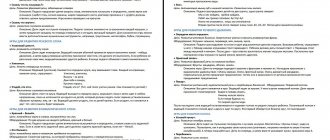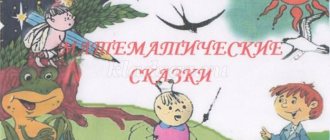Established traditions of preschool educational institutions, groups
Folk traditions have existed since time immemorial. Over time, with the development of society, traditions expand, change, some are forgotten, and some, on the contrary, become firmly established in our lives. There are family traditions, there are traditions that belong to a particular group, but no matter what the traditions are, they are all aimed at uniting people, the desire of people to unite and somehow diversify their lives, decorate them emotionally, bring some positive aspects, associated with a significant event, with the memory of good deeds.
There are traditions in raising children. Basically, these are traditions specific to one particular family. And first of all, in the mind of a small child, the traditions of relationships that exist in the family between parents are deposited; the child develops tastes and habits similar to adults long before the process of realizing what is happening begins. After all, children’s behavior follows the principle of copying. As the child grows up, he comes to kindergarten and his behavior becomes more conscious. Finding himself in a new environment, a child learns new patterns of behavior and masters forms of human relationships that are new to him. The child begins to develop moral qualities, aspirations, and ideals. And this formation is greatly facilitated by those sometimes unique traditions that exist not only in kindergarten, but specifically in each kindergarten group. Each such tradition is aimed, first of all, at uniting the team. And if the teachers in the group adhere to a humane approach to children, where each child is an individual, and everyone together is a friendly team, then it is traditions that help the child master the values of the team, promote a sense of belonging to a community of people, teach them to predict the development of events and choose methods of action. Therefore, creating group traditions in kindergarten and passing them on to the next generation of students is necessary and necessary work.
Traditions play a big role in strengthening friendly relations and provide great assistance in raising children. Traditions in which children directly participate together and with the teacher are firmly embedded in children’s memory and are already inextricably linked with childhood, with the memory of kindergarten as a common home, where every child is loved and respected. Our kindergarten has already firmly established traditions that have found a response in the hearts of more than one generation of pupils. These traditions are accepted with great pleasure by children and parents, improved and multiplied. Each tradition is aimed at achieving a specific educational goal. Each tradition is time-tested.
Traditions of preschool educational institutions, groups
1. “Good morning!”
Goal: To ensure the child’s gradual integration into the rhythm of group life, to create a good mood, and to set up friendly communication with peers.
2. “My mood.”
Goal: Observation by the teacher of the emotional state of each child in order to provide timely correction and support for the development of the child’s personality.
3. “Celebrating a birthday.”
Goal: To develop the ability to empathize with joyful events, to evoke positive emotions, to emphasize the importance of each child in the group.
4. “Meeting the employees of the preschool educational institution.”
Goal: To introduce children to the professions of kindergarten, to develop respect for people of various professions who work in kindergarten. Promote expansion of contacts with adults.
5. "Excursion to school."
Goal: To prepare children to enter the “world of school”, to form psychological readiness for schooling.
6. “Walks around my native neighborhood.”
Goal: To expand children’s knowledge about the place where they live, to cultivate love for their homeland, to form moral and patriotic feelings.
7. “Workshop of good deeds.”
Goal: Involving children and parents in joint creativity, in order to establish a friendly atmosphere in the family and expand children’s knowledge about their loved ones.
8. “Visiting a book.”
Goal: To instill in children a culture of reading books, broaden their horizons, cultivate a love and respect for books.
9. "Excursion to the library."
Goal: To arouse in children an interest in reading, a desire to know the history of their people, to introduce them to the world of beauty, and to form an aesthetically developed personality.
10. “Goodbye, kindergarten.”
Goal: To make children want to go to school and gain certain knowledge. Passing the baton to younger preschoolers.
Holidays that we traditionally celebrate at preschool educational institutions
| Event | Age groups | Deadlines |
| Thematic day “Day of Knowledge” | Preparatory groups | September |
| Leisure “It’s great that we are all here today!” | All groups | September |
| Thematic day "Safety Day" | All groups | September |
| Festive concert “Teacher’s Day” (September 27) | All preschool groups | October |
| Day of the Elderly “Dedicated to people of beautiful age!” (October 1) | Senior and preparatory groups | October |
| Holidays "Autumn" | All groups | October |
| Leisure “Visiting a toy” | Early age, junior and middle groups | October |
| Entertainment for Mother's Day “Mom, Mommy, Mommy” (November 27) | All groups | november |
| Puppet show | Early age, junior and middle groups | november |
| Sports competitions "Winter Olympic Games" | Senior and preparatory groups | December |
| New Year holiday | All groups | December |
| Leisure “Winter fun” | Early age, junior and middle groups | January |
| Theme day "Thank you" | Middle, senior, preparatory groups | January |
| Thematic day “Day of lifting the siege of Leningrad” | Senior and preparatory groups | January |
| Sports festival for Defender of the Fatherland Day “Together with Dad” | Middle, senior, preparatory groups | February |
| Leisure “Etiquette for kids” | Early age, junior, middle groups | February |
| Festive concert for International Women's Day on March 8 “For dear mothers” | All preschool age groups | March |
| Folklore leisure “Maslenitsa” | All groups | March |
| Leisure “Spring has come!” | Early age, junior, middle groups | April |
| Entertainment "April Fool's Day" | Senior and preparatory groups | April |
| Leisure “Cosmonautics Day” | Middle, senior, preparatory groups | April |
| Holiday “So we have become a year older” (early age) | Early Years Groups | May |
| Graduation evenings “Goodbye kindergarten!” | School preparatory groups | May |
| Thematic day “Victory Day” (May 9) | Senior and preparatory groups | May |
| Thematic leisure “City Day” (May 27) | Middle, senior, preparatory groups | May |
Features of the educational process in the summer
Summer is an amazing time! And every child looks forward to this wonderful time.
The summer health period is a seasonal period of time during which a system of activities aimed at improving the health and physical development of children is implemented.
Preschool children's stay in the fresh air in the summer strengthens and hardens the child's body and has a positive effect on all-round development. The main task of adults is to satisfy as fully as possible the growing body’s need for rest, creative activity and movement. A clearly planned system of health, educational and entertainment activities will help ensure the necessary level of physical and mental development of children. It is important to organize the life of preschoolers in such a way that every day brings them something new, is filled with interesting content, so that memories of summer time, games, walks, holidays and entertainment, interesting episodes delight children for a long time.
At the same time, summer poses some dangers to children’s health - the risk of overheating, sunburn, insect bites, etc.
The success of summer health work with preschoolers is largely determined by how competently and timely all participants in the educational process prepared for it.
All types of children's activities are transferred to the air. Each type is given a place and time in the daily routine.
The priority areas of work of the State budgetary preschool educational institution of kindergarten No. 11 of a combined type in the Krasnoselsky district of St. Petersburg (hereinafter referred to as the OU) during the summer health period (hereinafter referred to as the LOP) are:
• physical education and health work;
• environmental education;
• gaming, musical, theatrical, visual activities.
The main goal of the work of the educational institution team in the LOP:
Preservation and strengthening of the physical and mental health of pupils during the summer period, taking into account their individual characteristics; complete satisfaction of the growing body’s needs for summer rest, creative activity and movement.
Tasks for the LOP:
1. Create conditions that ensure the protection of life and strengthen the health of pupils, promote their physical and mental development by activating movements and targeted communication with nature.
2. Implement a system of measures aimed at improving the health and physical development of children:
• Continue to carry out a system of health-improving activities, ensure that children spend maximum time in the fresh air.
• Diversify the physical activity of children during walks.
• Increase the motor activity of children during morning exercises through active play with running.
• Conduct gymnastics, physical education and music classes outdoors.
• Maintain drinking and eating habits.
• Maintain a daily routine.
• Protect children from injury and overheating, strictly observing all necessary requirements.
3. Implement a system of measures aimed at the moral education of children, the development of independence, curiosity and cognitive activity, the formation of cultural, hygienic and labor skills.
4. Expand and enrich children’s knowledge and ideas about objects of living and non-living nature, form the foundations of ecological culture.
5. Carry out pedagogical and health education of parents (legal representatives) of pupils on the issues of education and health of children in the summer.
6. Create conditions for the organized reception of newly admitted children and their painless socio-psychological adaptation in kindergarten.
7. Prepare the educational institution for the new academic year.
The health care system for children in the LOP includes:
• physical education and health work with children;
• organization of rational nutrition;
• hardening;
• health and educational work with parents (legal representatives) of pupils.
Principles for planning recreational work in educational institutions:
• integrated use of preventive, hardening and health-improving technologies;
• continuous implementation of preventive, hardening and health-improving measures;
• use of simple and accessible technologies;
• use of non-drug means of health improvement;
• formation of positive motivation in children to carry out preventive hardening and health-improving activities;
• increasing the efficiency of the system of preventive and health measures through compliance with basic rules and regulations: optimal motor mode, physical activity, sanitary condition of the institution, catering, air-thermal conditions and water supply.


